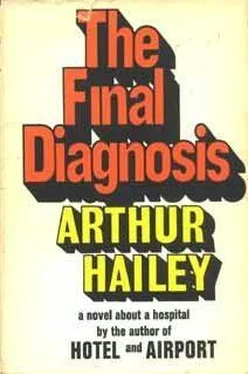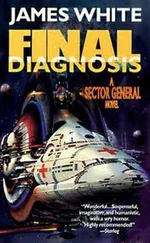Arthur Hailey - The Final Diagnosis
Здесь есть возможность читать онлайн «Arthur Hailey - The Final Diagnosis» весь текст электронной книги совершенно бесплатно (целиком полную версию без сокращений). В некоторых случаях можно слушать аудио, скачать через торрент в формате fb2 и присутствует краткое содержание. Жанр: Триллер, на английском языке. Описание произведения, (предисловие) а так же отзывы посетителей доступны на портале библиотеки ЛибКат.
- Название:The Final Diagnosis
- Автор:
- Жанр:
- Год:неизвестен
- ISBN:нет данных
- Рейтинг книги:4 / 5. Голосов: 1
-
Избранное:Добавить в избранное
- Отзывы:
-
Ваша оценка:
- 80
- 1
- 2
- 3
- 4
- 5
The Final Diagnosis: краткое содержание, описание и аннотация
Предлагаем к чтению аннотацию, описание, краткое содержание или предисловие (зависит от того, что написал сам автор книги «The Final Diagnosis»). Если вы не нашли необходимую информацию о книге — напишите в комментариях, мы постараемся отыскать её.
The Final Diagnosis — читать онлайн бесплатно полную книгу (весь текст) целиком
Ниже представлен текст книги, разбитый по страницам. Система сохранения места последней прочитанной страницы, позволяет с удобством читать онлайн бесплатно книгу «The Final Diagnosis», без необходимости каждый раз заново искать на чём Вы остановились. Поставьте закладку, и сможете в любой момент перейти на страницу, на которой закончили чтение.
Интервал:
Закладка:
If Orden Brown had wanted, he had explained frankly to O’Donnell, he could have forced a showdown and had his own way. He could, if he wished, have used his influence to ease some of the elderly, inactive members out of office. But this would have been shortsighted, because most were wealthy men and women and the hospital needed the legacies which normally came to it when its patrons died. If defeated now, some of the people concerned might well change their wills, cutting the hospital off. Eustace Swayne, who controlled a department-store empire, had already hinted that this might happen. Hence the need by Orden Brown for diplomacy and caution.
Some progress had been made, though, and one step which the chairman had undertaken with approval from a majority of the board members was to negotiate for a new chief of surgery. That was why he had approached O’Donnell.
Over dinner O’Donnell had shaken his head. “I’m afraid it’s not for me.”
“Perhaps not,” Brown had said. “But I’d like you to hear me out.”
He was persuasive, this man of industry who, though a scion of a wealthy family, had worked his way from puddler, through the mills, to the administrative office and eventually the president’s chair. He had a feeling, too, for people; the years in which he had rubbed shoulders daily with laborers in the mill had given him that. This may have been a reason he had accepted the burden of lifting Three Counties out of the mire into which it had fallen. But for whatever reason, even in the short time they had been together O’Donnell had sensed the older man’s dedication.
“If you came here,” Brown had said to him near the end, “I couldn’t promise you a thing. I’d like to say you’d have a free hand, but I think the chances are you’d have to fight for everything you wanted. You’d meet opposition, entrenchment, politics, resentment. There would be areas in which I couldn’t help you and in which you would have to stand alone.” Brown had paused, then added quietly, “I suppose the only good thing you could say about this situation—from the point of view of someone like yourself—is that it would be a challenge, in some ways the biggest challenge a man could take on.”
That was the last word Orden Brown had said that night about the hospital. Afterward they had talked of other things: Europe, the coming elections, the emergence of Middle East nationalism—Brown was a much-traveled and well-informed man. Later his host had driven O’Donnell to the airport and they had shaken hands at the ramp. “I’ve enjoyed our meeting,” Orden Brown had said, and O’Donnell had returned the compliment, fully meaning it. Then he had boarded the airplane, intending to write off Burlington and to think of his journey there as a learning experience.
On the flight back he had tried to read a magazine—there was an article about championship tennis which interested him. But his mind wouldn’t register the words. He kept thinking about Three Counties Hospital, what he had seen there and what was needing to be done. Then suddenly for the first time in many years he began to examine his own approach to medicine. What does it all mean? he had asked himself. What do I want for myself? What kind of achievement am I seeking? What have I got to give? At the end what will I leave behind? He had not married; probably he never would now. There had been love affairs—in bed and out—but nothing of permanence. Where is it leading, he wondered, this trail from Harvard, Presbyterian, Bart’s . . . to where? Then suddenly he had known the answer, known that it was Burlington and Three Counties, that the decision was firm, irrevocable, the direction set. At La Guardia, on landing, he had sent a wire to Orden Brown. It read simply, “I accept.”
Now, looking down at the plans of what the administrator had called flippantly “the New Jerusalem,” O’Donnell thought back to the three and a half years which lay behind. Orden Brown had been right when he had said they would not be easy. All the obstacles which the board chairman had predicted had proven to be there. Gradually, though, the most formidable had been overcome.
After O’Donnell’s arrival the former chief of surgery had slipped quietly out. O’Donnell had rallied some of the surgeons already on staff who were sympathetic to raising the hospital’s standards. Between them they had tightened surgical rules and had formed a strong operating-room committee to enforce them. A tissue committee, almost defunct, was reactivated—its job, to ensure that mistakes in surgery, particularly the unnecessary removal of healthy organs, were not repeated.
The less competent surgeons were gently but firmly urged to limit themselves to work within their capabilities. A few of the botchers, the assembly-line appendix removers, the incompetents, were given the choice of resigning quietly or being ousted officially. Though to some it meant partial loss of their livelihood, most chose to leave quietly. Among the latter was one surgeon who had actually removed a kidney without ascertaining that the patient had already lost one in previous surgery. The dreadful mistake had been revealed at autopsy.
Removal of that surgeon from the hospital’s roster had been easy. Some of the others, though, had proved more difficult. There had been rows before the County Medical Committee, and two surgeons, formerly on Three Counties’ staff, now had law suits pending against the hospital. This, O’Donnell knew, was going to mean some bitter controversy in court, and he dreaded the publicity which was certain to surround it.
But despite these problems O’Donnell and those behind him had had their way and the gaps in staff were painstakingly filled with new, well-qualified men, some of them graduates from his own alma mater whom O’Donnell had cajoled and persuaded to set up practice in Burlington.
Meanwhile the Division of Medicine had a new head—Dr. Chandler, who had been on staff under the old regime but had been frequently outspoken against it. Chandler was a specialist in internal medicine, and while he and O’Donnell sometimes disagreed on hospital policy, and O’Donnell found the other man at times pompous, at least Chandler was uncompromising when it came to upholding medical standards.
In O’Donnell’s three and a half years administration methods had been changed as well. A few months after his own arrival O’Donnell had told Orden Brown about a young assistant administrator, one of the best he had known in his hospital experience. The chairman had flown off and, two days later, come back with a signed contract. A month after that the old administrator, relieved to get out from under a job which had grown beyond him, had been honorably pensioned and Harry Tomaselli installed in his place. Now the whole administrative side of the hospital reflected Tomaselli’s brisk but smooth efficiency.
A year ago O’Donnell had been elected president of the hospital’s medical board, which made him the senior practitioner at Three Counties. Since then he, Tomaselli, and Dr. Chandler had successfully broadened the hospital’s intern and resident training program, and already applications for enrollment were growing in number.
There was still a long way to go. O’Donnell knew that in some ways they were only at the beginning of a long program which would embrace the three basic tenets of medicine: service, training, research. He himself was forty-two now, would be forty-three in a few months. He doubted if, in the active years remaining to him, he would complete in full what he had set out to do. But the start was good; that much was reassuring, and he knew that his decision on the airplane three and a half years earlier had been right.
There were soft spots, of course, in the present setup. There had to be. Nothing this big was achieved easily or quickly. Some of the seniors on medical staff still fought off changes, and their influence was strong among the older members of the board, some of whom still remained—Eustace Swayne, as obstinate as ever, at their head. Perhaps this was a good thing, O’Donnell reflected, and perhaps there was justice sometimes in the assertion that “young men make too many changes too quickly.” But because of this group and its influence there were occasions when planning had to be tempered with prudence. O’Donnell accepted this fact himself but sometimes had difficulty in getting it across to the newer staff members.
Читать дальшеИнтервал:
Закладка:
Похожие книги на «The Final Diagnosis»
Представляем Вашему вниманию похожие книги на «The Final Diagnosis» списком для выбора. Мы отобрали схожую по названию и смыслу литературу в надежде предоставить читателям больше вариантов отыскать новые, интересные, ещё непрочитанные произведения.
Обсуждение, отзывы о книге «The Final Diagnosis» и просто собственные мнения читателей. Оставьте ваши комментарии, напишите, что Вы думаете о произведении, его смысле или главных героях. Укажите что конкретно понравилось, а что нет, и почему Вы так считаете.












